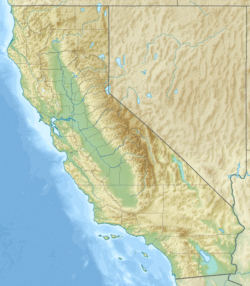Huasna River facts for kids
Quick facts for kids Huasna River |
|
|---|---|
|
Location of the Huasna River in California
|
|
| Country | United States |
| State | California |
| City | Huasna |
| Physical characteristics | |
| Main source | Confluence of Trout Creek and Stony Creek Los Padres National Forest 897 ft (273 m) 35°12′03″N 120°21′02″W / 35.20083°N 120.35056°W |
| River mouth | Cuyama River Twitchell Reservoir 535 ft (163 m) 35°00′57″N 120°19′45″W / 35.01583°N 120.32917°W |
| Length | 18 mi (29 km) |
| Basin features | |
| Basin size | 117 sq mi (300 km2) |
The Huasna River is a small river in the Central Coast area of California. It flows into another river called the Cuyama River.
Discover the Huasna River
The Huasna River is formed when two smaller streams join together. These streams are called Trout Creek and Stony Creek. They start high up in the Santa Lucia Range mountains. This area is part of the Los Padres National Forest.
The River's Journey
From where it begins, the Huasna River flows south. It passes by a small community named Huasna. It also flows through a flat area known as the Huasna Valley.
Eventually, the river reaches the Twitchell Reservoir. This reservoir is a large lake that was created by a dam built on the Cuyama River.
How Much Water Does It Have?
Like many rivers in this part of California, the Huasna River is often dry. It usually only has a lot of water during the winter and early spring. This is when California gets most of its rain.
Sometimes, when there's a lot of rain, the Twitchell Reservoir can fill up very high. If this happens, the lower parts of the Huasna Valley might get flooded.
 | William Lucy |
 | Charles Hayes |
 | Cleveland Robinson |


